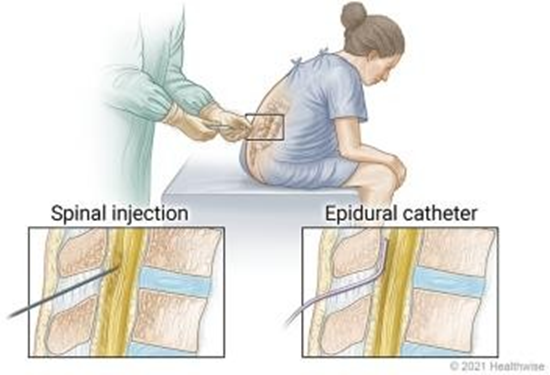A nurse is assessing a client who is in labor and is receiving epidural anesthesia. Which of the following findings should the nurse identify as the priority?
Urinary retention
Leg weakness
Hypotension
Temperature 39°C (102.2°F)
The Correct Answer is C
A. Urinary retention: While urinary retention can be a complication of epidural anesthesia, it is not the priority finding in this scenario. The priority is to address potential complications that can lead to maternal or fetal compromise.
B. Leg weakness: Leg weakness can occur as a side effect of epidural anesthesia but is not the priority finding in this scenario unless it is severe and compromises the client's ability to
mobilize or push during labor.
C. Hypotension: Hypotension is a common complication of epidural anesthesia due to sympathetic blockade, which can lead to decreased venous return and subsequent maternal
hypotension. Maternal hypotension can compromise uteroplacental perfusion, leading to fetal distress. Therefore, addressing hypotension promptly is the priority to prevent adverse maternal and fetal outcomes.
D. Temperature 39°C (102.2°F): While fever should be monitored and addressed, it is not the priority finding in this scenario unless it indicates an infection, which would require further assessment and intervention. However, maternal hypotension poses a more immediate risk to both the mother and the fetus during labor.

Nursing Test Bank
Naxlex Comprehensive Predictor Exams
Related Questions
Correct Answer is D
Explanation
A. The client's liver function test results are within the expected reference range: While monitoring liver function tests is essential for clients taking isoniazid and rifampin due to
potential hepatotoxicity, normal liver function test results do not necessarily indicate adherence to the medication regimen. Adherence is best assessed by the client's response to treatment, such as improvement in symptoms and resolution of the infection.
B. The client has a positive purified protein derivative test: A positive purified protein derivative (PPD) test indicates exposure to Mycobacterium tuberculosis but does not provide information about the client's adherence to the medication regimen for tuberculosis treatment. Adherence to treatment is determined by factors such as medication compliance and therapeutic response.
C. The client tests negative for HIV: The client's HIV status is not directly related to adherence to the tuberculosis medication regimen. While co-infection with HIV can impact the management of tuberculosis, testing negative for HIV does not confirm adherence to tuberculosis treatment.
D. The client has a negative sputum culture: A negative sputum culture indicates the absence of viable Mycobacterium tuberculosis organisms in the sputum sample and suggests effective
treatment and adherence to the medication regimen. Monitoring sputum culture conversion is a key indicator of treatment success in tuberculosis therapy.
Correct Answer is A
Explanation
A. Filing a report with the facility to document the incident as a near miss medication error is essential for tracking and investigating medication errors to prevent future occurrences.
B. While contacting the prescribing provider may be necessary, the priority is to report the error internally within the facility.
C. While documenting the nurse's actions is important, it is essential to report the error through the appropriate channels within the facility.
D. While informing the client about the error is necessary, the immediate action should be to report the error internally within the facility.
Whether you are a student looking to ace your exams or a practicing nurse seeking to enhance your expertise , our nursing education contents will empower you with the confidence and competence to make a difference in the lives of patients and become a respected leader in the healthcare field.
Visit Naxlex, invest in your future and unlock endless possibilities with our unparalleled nursing education contents today
Report Wrong Answer on the Current Question
Do you disagree with the answer? If yes, what is your expected answer? Explain.
Kindly be descriptive with the issue you are facing.
